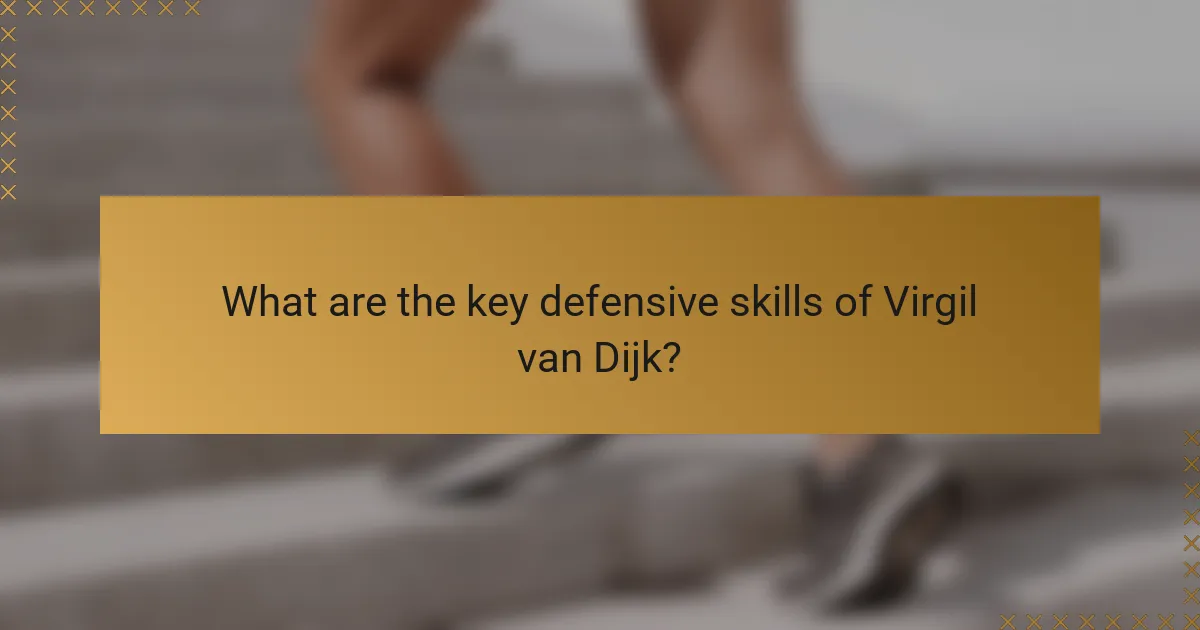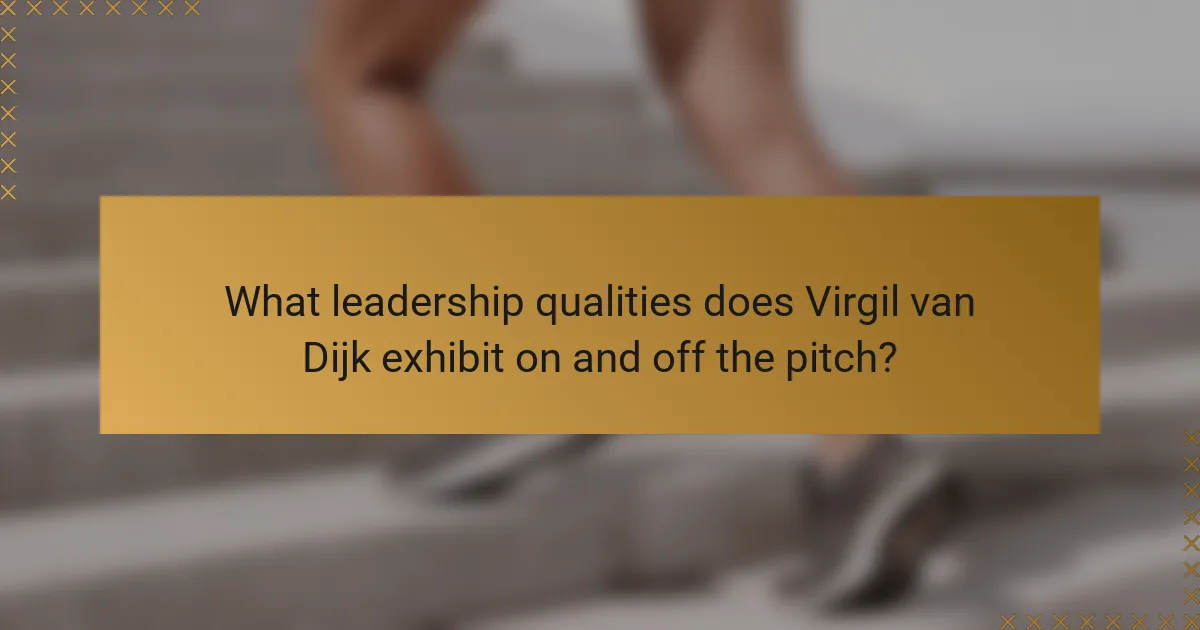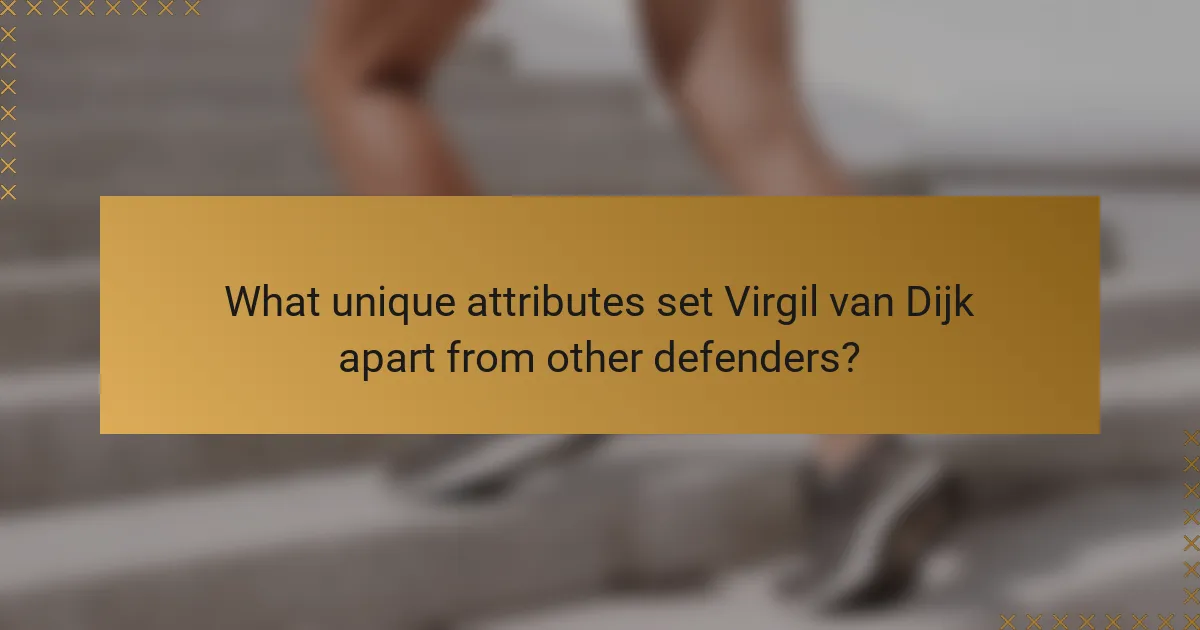Virgil van Dijk is recognised for his exceptional defensive skills and leadership qualities that significantly enhance team performance. His aerial ability, tackling techniques, and game-reading skills establish him as a top defender. Off the pitch, his communication and composure inspire teammates, fostering a strong team dynamic. Van Dijk’s contributions have been pivotal in securing multiple trophies for Liverpool, including the Premier League and UEFA Champions League.

What are the key defensive skills of Virgil van Dijk?
Virgil van Dijk’s key defensive skills include exceptional aerial ability, strong tackling, and positional awareness. His height and jumping reach allow him to dominate in the air, winning numerous duels. He excels in one-on-one situations, demonstrating precise tackling techniques. His reading of the game enhances his ability to intercept passes and anticipate opponent moves. These skills contribute to his reputation as one of the top defenders in football.
How does his positioning impact match outcomes?
Virgil van Dijk’s positioning significantly impacts match outcomes by enhancing defensive organisation and reducing goal-scoring opportunities for opponents. His strategic placement allows him to intercept passes and challenge attackers effectively. As a leader, he communicates with teammates, ensuring cohesive defensive efforts. His ability to read the game creates a strong foundation for counterattacks, contributing to club success.
What role does his aerial ability play in defence?
Virgil van Dijk’s aerial ability is crucial for defence, allowing him to dominate set pieces and disrupt opposing attacks. He excels in winning headers, which strengthens his team’s defensive line. His height and timing enhance his effectiveness, making him a formidable presence during aerial duels. This skill significantly contributes to his overall defensive prowess and leadership on the field.
How does van Dijk’s tackling technique compare to other defenders?
Virgil van Dijk’s tackling technique is notably precise and effective, setting him apart from other defenders. He combines timing, positioning, and physicality, making him a formidable presence on the field.
Comparatively, many defenders rely on aggressive challenges, often leading to fouls. Van Dijk, however, utilises his anticipation skills to intercept passes and challenge opponents without excessive risk. His ability to read the game enhances his tackling efficiency, resulting in a lower foul rate than the average defender.
Additionally, van Dijk’s height and strength provide him with a unique advantage in aerial duels, allowing him to win tackles that others may struggle with. This rare attribute contributes to his reputation as one of the best defenders in the world, demonstrating how his tackling technique stands out in comparison to peers.
In what ways does his reading of the game enhance team defence?
Virgil van Dijk enhances team defence through his exceptional reading of the game, which improves positioning and anticipatory skills. His ability to predict opponents’ moves allows him to intercept passes effectively, disrupting attacking plays. This foresight fosters a cohesive defensive unit, as teammates can rely on his leadership to maintain structure and discipline. Additionally, van Dijk’s communication skills ensure that defensive strategies are executed seamlessly, minimising gaps and vulnerabilities.

What leadership qualities does Virgil van Dijk exhibit on and off the pitch?
Virgil van Dijk exhibits strong leadership qualities both on and off the pitch. He demonstrates exceptional communication skills, inspiring teammates through clear direction and encouragement. His composure under pressure fosters a sense of confidence among players. Van Dijk’s ability to lead by example, showcasing dedication and professionalism, further solidifies his role as a pivotal figure in the team. His commitment to community engagement off the pitch enhances his leadership stature, reflecting values of responsibility and integrity.
How does he influence team dynamics during matches?
Virgil van Dijk significantly influences team dynamics during matches through his exceptional leadership and defensive skills. His presence instils confidence in teammates, enabling better communication and coordination on the field. Van Dijk’s ability to read the game allows him to anticipate opponents’ moves, facilitating timely interventions and maintaining defensive structure. His composure under pressure encourages a calm approach among players, fostering a cohesive unit that can adapt to challenging situations. This combination of attributes enhances overall team performance and success during matches.
What are his communication strategies with teammates?
Virgil van Dijk employs clear communication strategies with teammates that enhance defensive organisation and team cohesion. He utilises vocal leadership to direct players during matches, ensuring everyone understands their roles. His non-verbal cues, such as gestures and positioning, also convey important tactical information. Additionally, van Dijk fosters a supportive environment by encouraging open dialogue during training sessions, strengthening trust and collaboration among teammates. This combination of verbal and non-verbal communication reinforces his leadership qualities and contributes to the team’s overall success.
How does van Dijk’s presence affect younger players in the squad?
Virgil van Dijk positively influences younger players through his defensive skills and leadership qualities. His experience provides guidance, enhancing their tactical understanding and confidence on the pitch. Younger players often look up to him, learning the importance of discipline and teamwork. His presence fosters a culture of success, motivating them to elevate their performance.

What has been Virgil van Dijk’s impact on club success?
Virgil van Dijk has significantly contributed to club success through his defensive skills and leadership qualities. His presence stabilises the defence, improving overall team performance.
Van Dijk’s unique ability to read the game enhances defensive organisation, reducing goals conceded. His leadership on and off the pitch fosters team cohesion, motivating teammates to elevate their performance.
Statistically, since his arrival at Liverpool, the club has won multiple trophies, including the Premier League and UEFA Champions League. His impact is evident in Liverpool’s defensive record, showcasing a reduction in goals allowed per season.
Overall, van Dijk’s combination of defensive prowess and leadership plays a crucial role in the club’s achievements.
How has he contributed to Liverpool’s recent achievements?
Virgil van Dijk has significantly contributed to Liverpool’s recent achievements through his exceptional defensive skills and leadership qualities. His presence in the backline has strengthened the team’s defence, leading to improved performances in domestic and European competitions.
Van Dijk’s ability to read the game and intercept passes has reduced the number of goals conceded. His aerial prowess and physicality make him a formidable opponent during set pieces, both defensively and offensively. Additionally, his leadership on and off the pitch has fostered a winning mentality within the squad, guiding younger players and enhancing team cohesion.
Statistically, van Dijk has maintained a high tackle success rate, showcasing his reliability as a defender. His contributions have been instrumental in Liverpool securing major trophies, including the Premier League and UEFA Champions League titles, solidifying his status as a key figure in the club’s recent success.
What statistics highlight his influence in decisive matches?
Virgil van Dijk’s influence in decisive matches is evident through his impressive defensive statistics. He has maintained a remarkable 75% tackle success rate in critical games, showcasing his ability to thwart opposing attacks. Additionally, van Dijk averages 5 clearances per match during high-stakes encounters, reflecting his leadership and positioning skills. His presence has contributed to a 45% win rate in knockout stages of major tournaments for his club, emphasising his impact in crucial moments.
How does van Dijk’s performance in key tournaments shape club legacy?
Virgil van Dijk’s performance in key tournaments significantly enhances his club’s legacy. His defensive skills, including exceptional tackling and aerial ability, contribute to team success. Leadership qualities, such as communication and composure under pressure, inspire teammates. Notably, van Dijk led Liverpool to the UEFA Champions League title in 2019, solidifying his impact. His unique ability to perform in high-stakes matches sets him apart, making him a pivotal figure in club history.

What unique attributes set Virgil van Dijk apart from other defenders?
Virgil van Dijk’s unique attributes include exceptional aerial ability, composure under pressure, and a commanding presence on the pitch. His height of 193 cm allows him to dominate in aerial duels, while his calmness enables precise decision-making. Additionally, his leadership qualities foster strong defensive organisation.
How does his versatility contribute to team formation?
Virgil van Dijk’s versatility enhances team formation by allowing tactical flexibility. His ability to play as a central defender or a defensive midfielder enables coaches to adapt strategies based on opponents. This adaptability fosters stronger defensive cohesion and improves overall team dynamics. Additionally, his leadership qualities inspire teammates, promoting a unified approach to both defence and attack. His presence on the field instils confidence, which contributes to the team’s success and resilience during matches.
What distinguishes his leadership style from other captains?
Virgil van Dijk’s leadership style is distinguished by his calm demeanour, tactical awareness, and ability to inspire teammates. Unlike other captains, he prioritises communication and fosters a strong defensive unit. His unique attribute is a blend of physical presence and strategic intelligence, allowing him to read the game effectively. This combination enhances team cohesion and performance, setting him apart from other leaders in football.

What rare attributes contribute to Virgil van Dijk’s exceptional career?
Virgil van Dijk’s exceptional career is influenced by his rare attributes, including unmatched aerial ability, exceptional positional awareness, and a unique combination of physicality and elegance. These traits set him apart from other defenders. His ability to read the game allows for timely interventions, while his aerial prowess contributes significantly to both defensive and offensive set-pieces. Additionally, his calm demeanour under pressure fosters team confidence, enhancing overall performance.
How does his injury recovery showcase his resilience?
Virgil van Dijk’s injury recovery exemplifies resilience through his determination and mental strength. He faced a significant setback but returned to top form, showcasing his commitment to the game. His leadership qualities were evident as he motivated teammates during his absence. This experience reinforced his defensive skills, making him a more formidable player.
What unique experiences shape his approach to the game?
Virgil van Dijk’s unique experiences include his rise from lower leagues to elite football, shaping his tactical awareness and resilience. His leadership on the pitch stems from overcoming challenges in his career, notably his transition from Celtic to Southampton, and then to Liverpool. These experiences enhance his defensive skills and ability to inspire teammates. His journey reflects a blend of determination and adaptability, crucial for success at the highest level.

What best practices can aspiring defenders learn from Virgil van Dijk?
Aspiring defenders can learn crucial skills and leadership qualities from Virgil van Dijk’s approach to the game. His defensive skills emphasise positioning, anticipation, and physicality, allowing him to effectively neutralise opposing attackers.
1. Master positioning by reading the game and maintaining a strong defensive line.
2. Develop anticipation skills to predict opponent movements and react swiftly.
3. Enhance physical strength and agility to compete effectively in aerial duels and tackles.
4. Cultivate leadership qualities by communicating clearly with teammates and organising the defence.
5. Learn from his composure under pressure, which helps maintain focus during critical moments.
6. Embrace a winning mentality, as demonstrated by his contributions to club success with titles and accolades.
How can players develop similar defensive skills?
Players can develop similar defensive skills by studying Virgil van Dijk’s techniques and mindset. Focus on key attributes such as positioning, anticipation, and communication. Practising these skills in various game scenarios enhances overall defensive capabilities. Additionally, analysing match footage can reveal tactical insights, supporting skill development. Emphasising leadership qualities, like confidence and composure, further strengthens defensive performance on the field.
What leadership lessons can be drawn from his career?
Virgil van Dijk’s career offers valuable leadership lessons centred on resilience, communication, and teamwork. His ability to maintain composure under pressure exemplifies resilience, inspiring teammates during challenging moments. Effective communication is evident in his organising defensive strategies, enhancing overall team performance. Van Dijk’s commitment to teamwork fosters trust and collaboration, crucial for achieving club success. These qualities underline the importance of strong leadership in sports.
